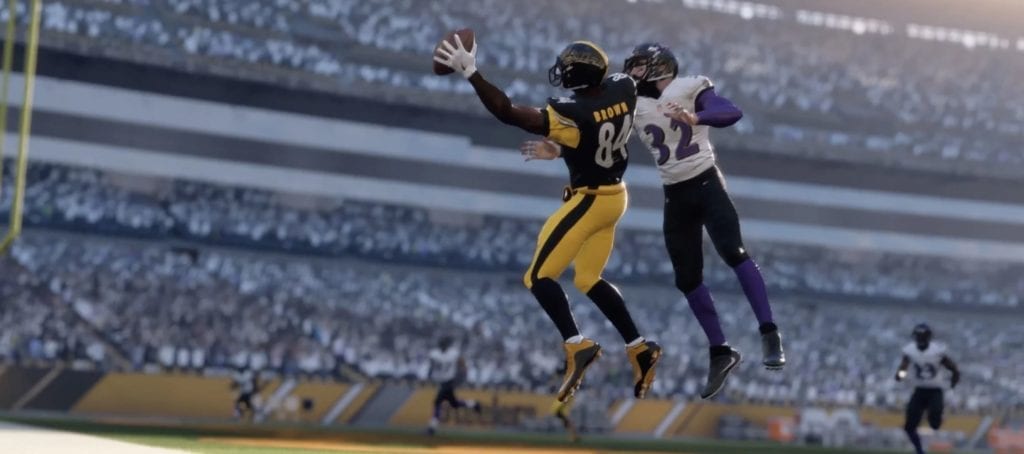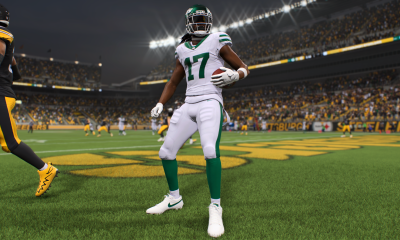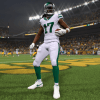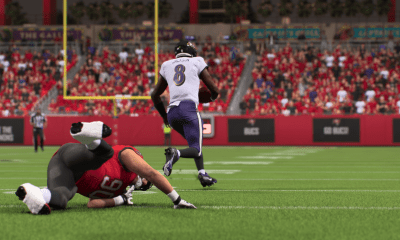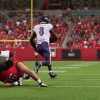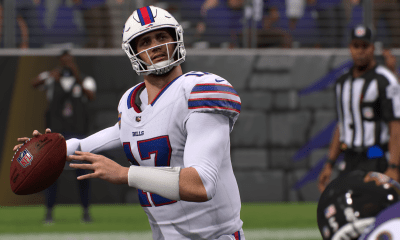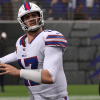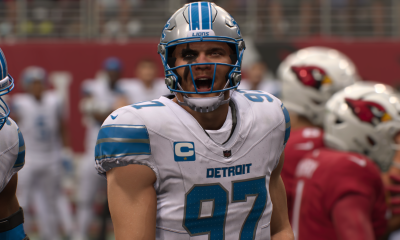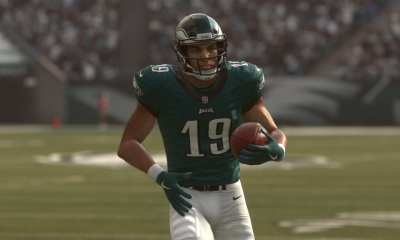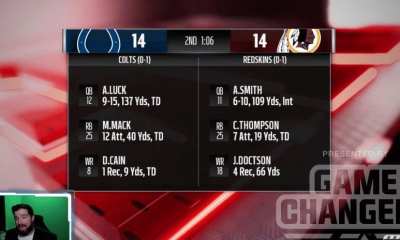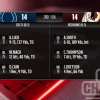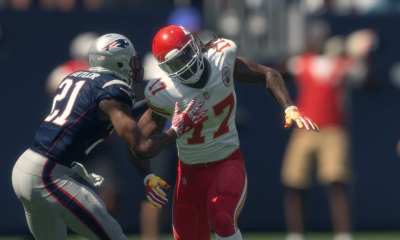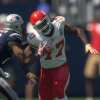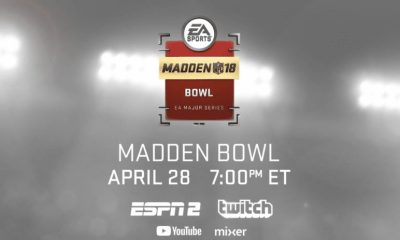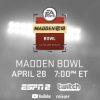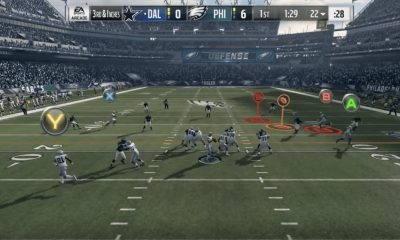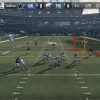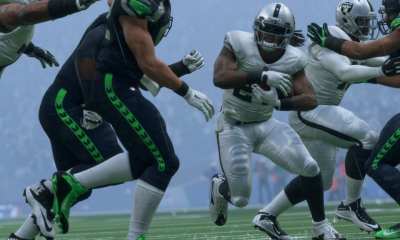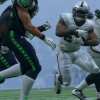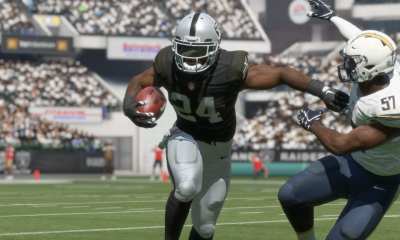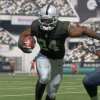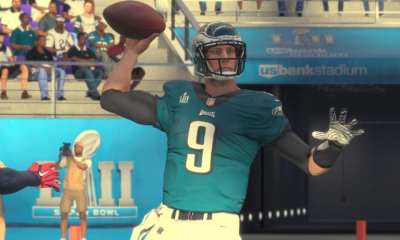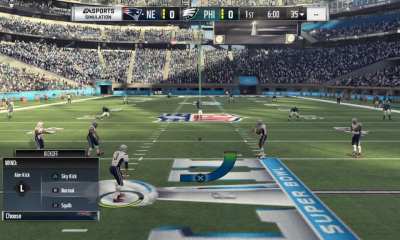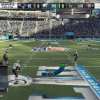Madden NFL 18
Madden NFL 18: Initially It Seems A Step (But Not a Leap) Forward
Though some who watched the first gameplay videos of Madden 18 may have been quick to dismiss it as Madden 17.5, the truth is that might be more of a compliment to last year’s game than it is an insult to this year’s one. Madden 17 was quite impressive in its own right and a more polished version of the game with the addition of a few innovative features proves at first glimpse to be a more satisfying proposition than you might expect.
Recommended Videos
Here are some things that have jumped out in the little time I’ve had with Madden 18 so far:
Audiovisual
- This is where the power of the Frostbite engine is really on display. The openings of games have never been more electric, with teams emerging dramatically from their tunnels, grandiose shots of meticulously re-created stadiums and–of course– ‘splosions that will have you thinking twice about pushing any buttons to get to kick-off quicker.
- Once you’re out on the field too, you’ll also notice immediately how much better the lighting looks, creating more vibrant colors and textures alongside bulkier renderings of players complete with all sorts of minute details that haven’t been there in the past. From dynamic player introductions to replays of big plays from multiple angles, the game flows naturally in a way that’s closer to a television broadcast than ever.
- Although the movements of players definitely feel smoother and more realistic, there are still issues that persist with collision detection at times, as it’s not uncommon to see players’ limbs going through bodies. There are also some dips in frame-rate that are more apparent on inside running plays and check-downs in the flat.
Offense
- The running game has never been more fun and intuitive, with blockers showing better awareness at creating creases and holes to run through. Guards pull quicker on plays and superior linemen are able to sustain their blocks for longer. Fans will also be pleased to see heavier run formations working more effectively against better pass-defending formations like nickel and zone, as this wasn’t the case last year. That said, there are times (particularly on outside runs) when blockers still seem to attack a different defender other than the one right in front of them who clearly provides the most immediate danger of making the tackle.
- I was skeptical about the benefits of the new target passing mechanism but have to say that the optional feature has proven so far to be more enjoyable than I was expecting. It obviously takes some time to get used to it (open practice is your best friend) and you will find that employing it incorrectly will lead to interceptions, sacks or–worst of all–throws that go backwards and are live fumbles, but there are routes (like streaks or curls) and certain situations where it can really become a valuable new tool to have at your disposal. It can’t be emphasized enough how incredibly good it feels when you’re able to thread the needle perfectly with a targeted pass. With more time to master it, I wouldn’t be surprised to see some of the best players using it pretty regularly.
- Making moves when running with the ball, if done when situationally appropriate and timed right, can be more effective this year. I’m especially fond of the very subtle juke that can have you maneuver past an oncoming tackler while losing little speed or momentum in the process.
Defense
- I’m impressed by and grateful for the addition of handy markers on the field to assist you when in coverage, keeping you aware at all times of where you should be positioned within zones and also which receivers you are responsible for when they enter into your zone (not to mention when you should be letting a receiver go as they vacate your zone, which can be just as important but difficult sometimes to gauge).
- Linebackers are a little slower than they were last year and, combined with the fact that you can no longer just hold down a button to snag an interception when the ball comes your way, this makes it more challenging to cover the middle of the field and consequently, more rewarding when you do manage to hold up in coverage.
- The improved hit stick is fun but has a bit of a learning curve for the uninitiated. I have found it to be awfully unforgiving when used at the wrong time, creating awkward animations and missed tackles. I often opt instead for the safer conservative tackle to properly wrap up a ball-carrier and avoid giving up a big play.
Stray Thoughts
- I was perhaps expecting to see even more of a pronounced difference between the new 3 styles of play but that’s not to say the variations between each are negligible. I have found Arcade to be the most distinct, as receivers routinely make insane leaping catches in even the tightest of coverages to ensure for a high offensive output. The biggest discrepancy I saw between Simulation and Competitive was that defenders will drop fewer interceptions in the latter. Simulation still didn’t yield nearly as many penalties as you would see in a real game but I’m sure a tweak of the sliders might fix that. Injuries, meanwhile, can be plentiful on Simulation.
- I haven’t seen many fumbles at all in the games that I have played, certainly not enough to approach anything resembling realistic numbers. But the few fumbles I have seen did show that players still seem to struggle to pick up a loose ball that’s right in front of them at times.
- Playing entirely against the CPU in my time with the game, it’s clear that issues with AI continue to persist. Quarterbacks show little pocket presence, ignoring the kind of pressure that should see them sliding or scrambling out of danger one way or another. Though I recognize how hard it is to get AI to mimic some of the more subtle nuances of football, it’s downright confusing to witness the kind of flawed logic some of these AI coaches will show when calling plays and utilizing time-outs in a 2 minute drill.
What do you think of the game after a couple of days with it?


